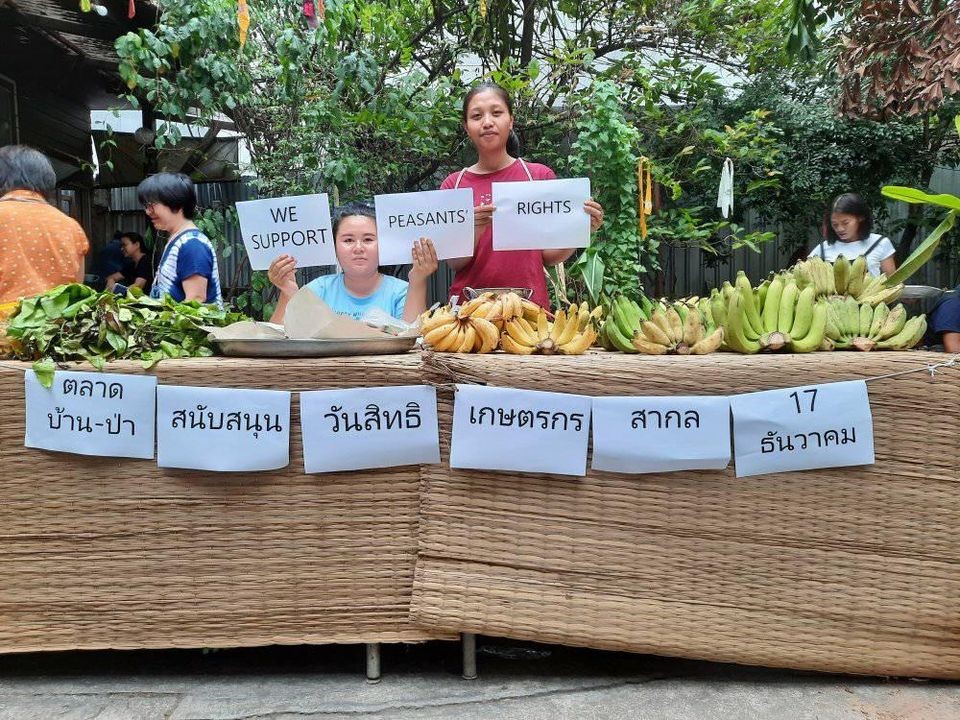The Assembly of the Poor (AOP) is a nationwide grassroots movement for peasants’ rights. AOP members are mostly peasant groups with several worker unions. AOP is a member of La Via Campesina in the Southeast and East Asia Region. Due to their difficult economic situation, the majority of the members still practice conventional agriculture. Although conventional agriculture is unsustainable, monoculture, and dependent on agrochemicals, most farmers, including AOP members, are reluctant to shift to agroecology because they are dependent on money from selling cash crops to big buyers and cannot take risks. Therefore, in the past years, AOP’s work on the promotion of agroecology is slow, intermittent, and not well-organized. A small minority of the members shifted to agroecology.
Since 2017, AOP participated in the AFOSP-MTCP2 Thailand project. The project supports AOP to accelerate the change. AOP organized activities emphasizing the MTCP components of structuring service functions for members, value chain and market linkage, technical support, and capacity building.
As a result, AOP was able to give extension services to 16 farmers organizations/communities/groups including training and exposure visits on agroecology, productivity improvement, product quality enhancement, food preservation and processing, new food product development, diversification of farm products, grouping product clusters, and development of various types of markets. Similarly, AOP encourages its peasants to diversify market channels to reduce the dependency on big lot buyers.
In addition, AOP received another short-term small fund for its “Peasant Markets” Project to mitigate the impacts of the COVID-19 pandemic on its members. The organization supports its 8 groups to sell the products in their home on a pre-order basis using Facebook to inform the consumers of the availability of products in the current month. AOP also supports them to sell in the peasant market in Bangkok to serve the low-income urban consumers. The orders are placed in advance and the consumers will pick up the order themselves on the specific date to reduce the trips to markets.






Processed food products 
Ready-to-eat food 
Herbal traditional medicine 
Selling in big lot by pre-ordering 
Selling in market fairs 
Kok Edoi Community Roadside Market for Forest Products 

Campaign actions in the Peasant market 
Facebook for online selling
Innovations / Good Practices
- Localization of the food system, rural economy, food sovereignty, agroecology, and peasants’ rights are the principles that AOP follows. AOP peasants in rural villages in 3 regions of Thailand produce various food and products to serve the community first to ensure the local people’s access to good and healthy food at fair prices to both consumers and producers.
- The Peasant Market in Bangkok serves the low-income workers in Bangkok, in addition to the middle-class consumers who support sustainable production and the consumption of healthy food.
- The products are diverse, seasonal, and chemical-free and many are native food products
- Fresh produces of general varieties such as eggplants and long beans
- Native and forest foods such as wild yams, honey, etc.
- Preserved and processed food such as salted eggs, curry paste, rice wine, etc.
- Meat, including chicken, eggs, fish, and small animals (frogs, rats, crickets)
- Ready-to-eat food products such as chili paste, snacks, etc.
- Traditional herbal medicines
- Woven and basketry products
- Under the “Peasant Market” name, AOP includes different types of markets
- Private stalls/selling at home or farm
- Collective stalls at the group’s office
- Collective stalls in the village’s fresh market
- Peasants’ own market
- Collective stalls in market fairs or rotating markets
- Collective selling to a wholesale buyer
- Online selling on a pre-order basis
- Selling among AOP members
- The market is also used for advocacy and campaign actions.
Impacts
- AOP peasants are motivated to shift to sustainable agroecological production and reduce the dependency on monoculture of cash crops.
- The production and economic activities strengthen the solidarity in AOP. Although it is not practical for geographical consolidation, the peasants who produce similar products are grouped into loose “product clusters” to exchange knowledge and information about the products.
- AOP peasants earn income from diversified products year-round.
- Localization of the food system helps AOP peasants survive during the COVID19 pandemic because they are not dependent on the food industry and tourism.
- AOP agroecological products gain more recognition and trust from lower-income workers and middle-class consumers both in Bangkok and provinces.
Facilitating Factors
- The fund to facilitate the shift to agroecology and to support the production and marketing.
- AOP member organizations are generally strong. They can use the experiences to implement collective production and collective marketing.
Challenges
- Climate crisis is the major challenge to maintain productivity and product quality. The challenge is more severe in many AOP communities that cannot access public services or agricultural aids from the government.
- AOP producers must understand the needs of consumers. For example, the city people will not buy products in big packages because of the smaller family size.
- The cost of transportation.
Lessons Learned
- Peasants can earn a living income from the collective production of diversified products and collective selling through diversified marketing channels. They do not have to depend on only one source of income from contract farming or cash crops.
- The direct connection between the consumers and producers can contribute to fair prices for the two parties.
- To ensure the year-round supply and income, peasants must make the practical seasonal food calendar and collective production and marketing planning.
Recommendations
- The government must recognize the agroecology and localization of the food and agriculture system as the way to eliminate poverty, strengthen the rural economy, enhance access to good and healthy food for local people, especially lower-income earners, and mitigate the severity of health crisis such as during the COVID19 pandemic.
Available documentation:

Comments are closed